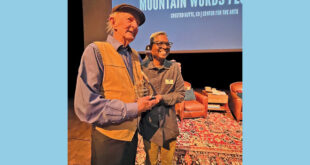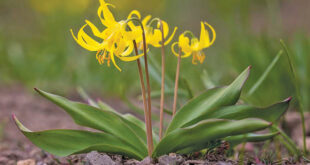Crested Butte Film Fest opens next week
By Dawne Belloise
Red Lady Films’ one-hour movie, High Country, will be one of the featured flicks at this year’s virtual Crested Butte Film Festival September 25 through October 4, on TVs and computer screens everywhere.
The film’s director Conor Hagen and producer Ali Batwin will premiere the film at both the Breckenridge Film Festival and the Crested Butte Film Festival.
Hagen describes his movie, saying, “Entrenched in nostalgia, High Country tells a timeless American story of how a community of conscientious and forward-thinking young people, disguised as ski bums and hippies, happened upon a ramshackle mining town on the fringe of society and worked to conserve and protect it for years to come. Hidden amidst the high peaks of the Rocky Mountains, Crested Butte, Colorado has always been a place defined by its people. To the outside world, it is a town known for its world-class biking, skiing, hiking, wildflowers and natural beauty. But to locals, it is known for much more. It is considered with great pride as a place defined by its conservationist spirit, its antics, its costume parties, its defiance of the norms and mostly by its strength of community. But, as a resort town, Crested Butte is not alone in its struggles to cope with economic pressures and environmental impacts at the hand of tourism and growth. As one of our subjects in the films puts it, ‘Crested Butte is a microcosm of a much larger American debate.’”
Hagen was born in Crested Butte to parents who discovered the town’s quirkiness and moved here in the early 1970s. Although the family moved to Taos when he was only three, Hagen still identifies with Crested Butte, visiting often as a child and later as an adult. “It was a second home to me,” he says. His film was inspired by the wild stories he was told as a child of those untamed days of Crested Butte.
“I grew up hearing about this wild mountain town where outlaws and ski bums would converge,” he says. “A frontier town where they could do whatever they wanted.” Those ski bums and outlaws are the “mid-timers” of today but when they first arrived on the scene, the mines had closed over a decade prior and those conservative mining families were aging. “These ‘70s kids really had a blank canvas of a town,” and he notes that there was a crucial turning point in the town’s direction when it shifted to the younger generation who were then running for office and subsequently got elected.
Hagen feels that there are very few places that are as unique as Crested Butte in its self-determined development. “A fringe of society mountain town where people could create their own world. Initially, the film was intended to recount these stories I had heard growing up but then my producer Ali Batwin and I, in the course of doing interviews and research, felt that the really important story to tell was how this community worked together to prioritize community and conservation. We shifted gears and really tried to examine how the community that emerged in the 1970s worked to prioritize sustainable long-term growth. Back then, they were fighting Amax [the mining company that wanted to decimate Mt. Emmons, aka Red Lady for its molybdenum] and they were prioritizing conservation of the environment and local small business so that they could maintain and sustain a local economy.”
When the younger generation came into the government on the Town Council in the 1970s, they sought to learn about what other small towns were doing to promote community over exploitative development and quick growth. As George Sibley says in the film, “Progress is too often not fitted with steering and brakes.”
Hagen comments, “What wound up happening was that through those protections put into place, tourism boomed. Crested Butte has the charm and that’s what drew the tourists, so now we have a town that’s dependent on tourism.”
Hagen wanted to tell a bigger story, through the lens of Crested Butte. “This is a much bigger small-town story and in fact, also a story that’s relatable to desirable and tourist-driven towns all across America,” he says.
Hagen feels that Crested Butte is an extremely special place and trying to close the door is unrealistic because, he says, “Change is inevitable, evolution through time is inevitable, it’s not realistic to say people can’t come to a town,” and there is currently a massive influx of new residents and wealth. “People have the freedom to move from one place to another so what must happen then, in spite of that, and most important, what needs to happen, is that locals need to continue to work hard to protect and conserve their community and educate the newcomers. There needs to be a mutual sense of respect for the place because without that the community is at risk.”
Hagen recounts the days of the miners and how they must have felt as those rebel hippies and ski bums moved in and took over their town. “Those ‘70s kids had an entirely different way of thinking than the old Croatian miners who inhabited the town. So what I think is the best possible solution is to educate and work hard to protect the community and environment. Change can be a good thing if people have respect and appreciation for the pillars of the community, which, in my mind, is the soul of Crested Butte, the people who live and work here. Crested Butte is a small bubble but that’s what the film addresses. It attempts to tell this bigger American story through the lens of Crested Butte.”
High Country, a production by Red Lady Films directed and edited by Conor Hagen and produced by Ali Batwin, will play at the virtual Crested Butte Film Festival 2020, running September 25 through October 4. High Country will be available to watch virtually online between the festival dates. Online information at thehighcountryfilm.com.
 The Crested Butte News Serving the Gunnison Valley since 1999
The Crested Butte News Serving the Gunnison Valley since 1999





